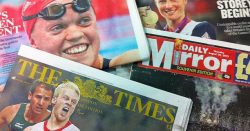Research conducted on behalf of the English Federation of Disability Sport (EFDS) has shown the public’s desire to see more disability sport in the media.
 In a report published by EFDS ahead of the Rio Paralympics, which had the support of the SJA, they flag the importance of coverage beyond the Games.
In a report published by EFDS ahead of the Rio Paralympics, which had the support of the SJA, they flag the importance of coverage beyond the Games.
To support journalists and those who provide news content on disabled people in sport, EFDS has published a better practice guide, which can be dowloaded in pdf format here.
EFDS commissioned ComRes, who spoke to disabled people, non-disabled people and sports journalists from local, national and specialist outlets. As well as benchmarking media’s current portrayal of disabled people in sport, it assesses opinions on disability sport news. The key findings show:
• The way the media reports on disabled people in sport has wider effects on people’s perceptions of disability.
• Despite the notable improvement in reporting since London 2012, disabled and non-disabled people want to see more disability sport coverage and parity with non-disabled people in sport.
• There needs to be long-term efforts to improve the media coverage in between Paralympic years.
• Journalists and sports providers need more support and guidance on appropriate reporting.
For journalists and news providers, there were some key messages:
• A number of groups can contribute to improving media coverage of disability sport and play an active role. They include journalists, news providers, National Governing Bodies of sport, sports clubs and ambassadors.
• Priorities should be to:
o Focus on achievement rather than disability
o Avoid overly using terms such as “inspirational”
o Clearly explain classification systems, recognising disability, but not dwelling on it
o Use higher quality images, especially for local events.
Last week, EFDS and ComRes hosted an event for journalists and key stakeholders in sport. Those present included BBC, Sky Sports News and Sport England. The hosts presented the findings, followed by a panel discussion including David Walker, the SJA’s immediate past chairman and the sports editor of the Daily Mirror and Tim Hollingsworth, the British Paralympic Association’s chief executive.
“The news we consume can affect everyone’s perceptions of themselves as people and, for the talented few in sport, as athletes,” Barry Horne, the chief executive at EFDS, said.
“This means that it is particularly important that coverage is positive if it is going to encourage disabled people to access opportunities and take part. That is why we all have an obligation to improve our reporting and articles about disabled people in sport.
“Although we are well placed to support journalists and sports providers before the most recognised event in disability sport, the Paralympics, it is paramount that, all year round, we address the issues raised.”
Andy Elliott, the SJA chairman, said, “It’s gratifying to know that as an industry we have improved since 2012 and that the majority of articles that report on sport for disabled people use positive language. But the research makes it clear that more can be done.
“The Sports Journalists’ Association is delighted to play its part in supporting EFDS and this important Guide will help sports journalists maintain momentum to increase coverage of disability sports at all levels.”
- The SJA is the largest member organisation of sports media professionals in the world. Join us: Click here for more details
FORTHCOMING SJA EVENTS
- Mon Sep 12: SJA Golf Day, Muswell Hill GC. Members and guests welcome
- Thu Dec 15, 2016: SJA British Sports Awards, sponsored by The National Lottery
- Mon Feb 27, 2017: SJA British Sports Journalism Awards, sponsored by BT Sport